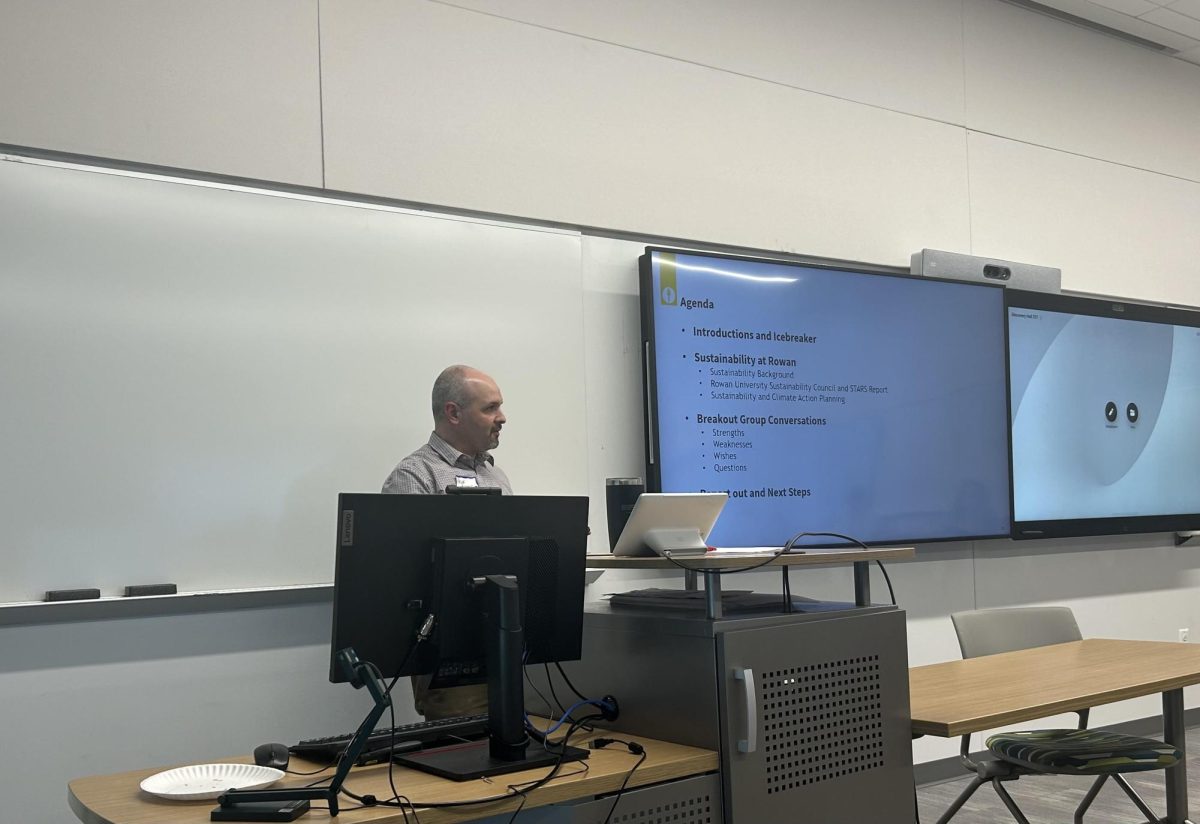
Maryela Gallardo
Dr. Garrett Broad speaks to workshop attendees. - Web Editor / Maryela Gallardo
Aimed at gathering student input on sustainability at Rowan University, the Rowan Provost’s Fellow for Sustainability, Garrett Broad, Ph.D, held a sustainability workshop on Tuesday, March 25 in Discovery Hall.
The workshop sought to raise awareness of the university’s current plans. Recently, Broad has been the lead convener for the new Rowan University Sustainability Council (RUSC) which is to serve as a way to coordinate, advance, and track sustainability activities and policies at the university. The goal is to incorporate topics of climate change, environmental impacts, and others related to teaching, research, and greening of campus operations.
“And the other thing that I think is we need to continue to demonstrate that there’s a student, faculty, and staff desire for this kind of action. So the more I can show that we’re doing this kind of stuff, the more likely I am to be able to go back to the provost and say,” said Broad. “Look what I was able to do. Look, here’s the demand, here’s why we should invest in this.”
The event, which was in coordination with the Student Government Association (SGA) and the Rowan Environmental Action League (REAL), encouraged students to ask questions about what the university is planning to do to advance sustainability efforts. The workshop was set up for students to have conversations with faculty members from the RUSC and the School of Earth and Environment.
The council completed a Sustainability Tracking Assessment & Rating System (STARS) report that audits the different elements of sustainability at Rowan. In their report, they found that they needed to make some improvements in getting the campus more involved in sustainability. However, in the research category, the score was very high. This means that there are a lot of Rowan’s faculty and staff researching environmental science, climate change, and other related topics.
Something that the council hopes to work on soon is being able to have an overview of the university’s greenhouse gas emissions and impacts, as this would also help raise the STARS score. If there is an increase in student input and public engagement, it would allow for more administrators to support these sustainability initiatives.
Broad does not just want faculty and staff to be involved in RUSC, but also students to represent the different committees.
“I think there’s a lot of power in getting people in rooms together, and I think that’s something that we’ve lacked historically here, right? You’ve got great stuff happening in the School of Earth and Environment. You got great stuff happening in engineering,” said Broad. “So I kind of have this philosophy of, if you bring people together, good stuff happens. So that’s for me, the number one priority.”
Linda Walczak, Director of Landscape Architectural Services for the Division of Facilities, Planning & Operations, has pushed for sustainability in this department.
“We plant native plants, we try and increase biodiversity. We do green infrastructure for stormwater management. Those are the top items, we plant trees for shade and climate, but it’s difficult when there are other priorities in the division,” said Walczak.
While she works to help the campus incorporate more green areas, Broad also wants to improve sustainability on various parts of campus. For example, connecting with the West Campus to learn more about how it can include sustainability efforts.
The last segment of this event was a breakout session where groups of five had conversations about the university’s progress on sustainability. Students spoke on the strengths and weaknesses of current projects, or problems students face when trying to be more sustainable on campus. They also spoke about what they wish there would be more of, and what others have seen in different universities that could work at Rowan. As well as the questions students might have about the future of the university’s sustainability initiatives.
In the breakout session, some students spoke about how, in some dorms, residents have stopped using the water fountains as the water quality was consistently poor for long periods. This indirectly increases the need for students to purchase plastic water bottles. Many want more transparency on what the university is doing regarding its sustainability plans. A lot of students coming into this workshop did not know about the talk about the Council for Sustainability at Rowan. They suggested implementing more solar panels in parking lots on campus so that the university can use them to reduce energy consumption.
Rowan University has had an incomplete history in sustainability plans and initiatives starting in 2009, when former President Farish signed the President’s Climate Commitment. Plans like this one and others that happened in 2020, 2009, and 2013 were climate efforts that did not progress far. The establishment of the RUSC could lead to long-term sustainability programs.
For comments/questions about this story DM us on Instagram @thewhitatrowan or email [email protected]